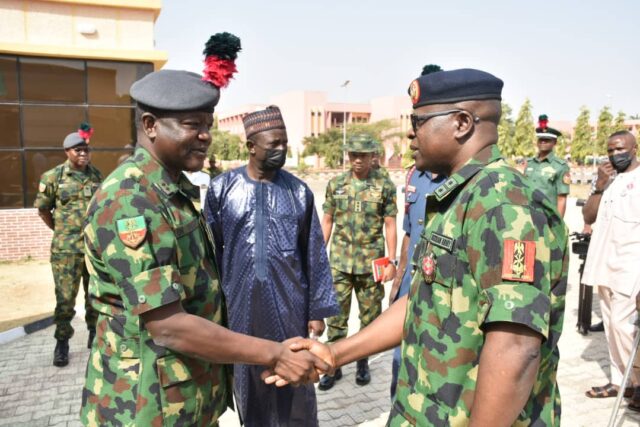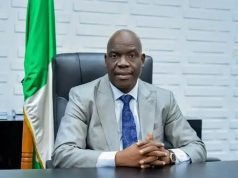By Richard Murphy
Horrifying. Outrageous. Those are the natural reactions that any sane person would think of in response to a motion currently being cooked up in the House of Representatives to draft members of the National Youth Service Corps (NYSC) into fighting terrorism, banditry and other violent crimes that currently plague the country.
The motion, “The need to review the National Youth Service Corps (NYSC) three weeks orientation camp to include security intelligence operations training for selected corps members,” is one that should never have been contemplated by anyone let alone committing it to paper and then presenting it before the highest law-making body of the land. Only those that harbour ill-will towards the younger population of this country could have come up with such a dangerous proposition.
Oftentimes, critics accuse federal law makers of being out of tune with the reality in the land, and the pushback from some quarters is that members of the National Assembly are being harshly judged. But in the matter of this motion to fully militarize the NYSC, or at least a section of the corps members for each batch of orientation, takes the cake for bungling. A face saving measure is for those behind this motion to drop it and make the additional effort to erase it from the annals of the National Assembly so that there would be no trace that someone once thought up such concept that should be considered criminal in a sane circumstance.
For context, the motion seeks to: “Mandate the House Committee on Defense and House Committee on Youth to review the curriculum for the National Youth Service Corps Scheme to include full intelligence operations for selected corps members; Mandate both House Committees to review the current partial-paramilitary training for NYSC during the 3 weeks orientation Camp to include tactical and intelligence data collation; Mandate all security agencies to engage the selected corps members to specialized military operations to improve on security personnel operations in Nigeria; and Mandate the house committee on youth, defense, police, interior, army, navy, air force, customs and committee on compliance to ensure legislative compliance.”
Too many things are wrong with these ambitions of the sponsors of the motion. For the sake of brevity, a few of them would be touched on in this piece. Readers are welcome to add the other cringeworthy deficit in conceptualizing this motion, the lawmakers are oblivious of.
First, corps members are already exposed to enough risks with the electoral duties some of them take on. In 2011, 10 corps members were killed in Bauchi state in election violence and that was because corps members performed electoral duties. In the subsequent elections since 2011, some corps members can attest to how they are threatened by people with vested interests. If this happens with electoral duties that span just a couple of weeks then one can imagine the consequences of taking on full military duties.
Secondly, the duration of the national youth service, one year, is not enough for the “selected” corps members to master the art of “tactical and intelligence data collation” on the scale required of professionals. A cursory check would have revealed to the House of Representatives members that those who handle these all-important tasks in the security agencies are products of years of training and experience – yet mistakes still happen. There is therefore the challenge of how to train convert corps members into experts in under three weeks and how they can acquire the requisite experience in the same space of time or even three months. They would not even have the advantage of being locals since they are statutorily not expected to serve in their home states, where they went to school or where they reside.
Furthermore, another problem arises from the preceding point. How do we deal with equipping thousands of youth with military skills, keep them for one year and then turn them loose in a country that is already grappling with crippling unemployment? It is doubtful that anyone wants to contemplate such a nightmarish situation. The news archives are replete with stories of ex-military and paramilitary personnel who took to crime upon leaving service – it is not assumed that every one that is equipped with military skills and let go will necessarily take to crime but the one percent that could take that route is a risk not worth taking.
Additionally, what would have been the solution to the challenge of training and letting go of the corps members is simply not practical. Each year, as many as 350,000 corps members are mobilized for the scheme; assuming 10 percent of this number is selected into the proposed para-military training, and it leaves the country with 35,000 youth trained in skills that would by default involve learning how to use firearms. In the space of four years the number of corps members that would have passed through that process would have exceeded the number of recruits that the entire security and paramilitary organizations in the country could absorb in that span of time. The resulting disaster would be complete.
Fifthly, even the corps members that are not selected, trained, and deployed in that capacity would become targets of terrorists and bandits. The NYSC uniform, which in the past decades have evolved into a symbol of the wearer being one whom the community must protect at all costs, will suddenly become the apparel of an enemy combatant as far as the terrorists are concerned. It is important not to lose sight of the reality that some members of the community in which these corps members serve are informants for the dark side. So the “tactical and intelligence data collators” would be sitting ducks from the day they leave orientation camp until such a tragic time that criminals decide to snuff the life out of them.
There is equally the problem of creating schism among corps members. A scheme that has thrived on the tenet of all corps members being equal will suddenly be confronted with the morass of “super corpers” in reference to the ones that would be trained to carry weapon, come into possession of sensitive intelligence, or trained to be militarily superior to their colleagues. Such “super corpers” will expectedly demand higher pay or special considerations to be treated differently from those that do not take the kind of risks they are exposed to. The foundation upon which the NYSC is based will simply unravel. That is not what we want as a country.
The motion can thus be concluded to be a joke taken too far by those that sponsored it. On the other hand, if the motion was not intended to be a comic relief amid the serious mood the country has been in, then it is a continuation of the selfish attempt to dismantle the NYSC to the detriment of the youth that draw inspirations from its unifying impact. The lawmakers would have to return to their drawing table, put on their thinking cap, and come up with an actually ingenious plot to destroy a scheme that Nigerians appreciate so much.
Interestingly, the NYSC has been contributing its quota towards addressing the insecurity in the land. Several experts and leaders of thoughts have identified youth unemployment as a major factor driving insecurity in the land, the argument involves how frustration and desperation drive the youth to engage in violent crimes. Taking guns to fight violent criminals would thus amount to tackling the symptoms but the NYSC through programmes run by its Skills Acquisition & Entrepreneurship Department (SAED) is addressing the root cause by preparing corps members to become entrepreneurs and employers of labour upon completion of their service year – some become business owners before their service year is over.
The Scheme similarly partners organizations to provide funding – in form of loans and grants for corps members to set up their small-scale businesses. The success stories from this initiative should have prompted the House of Representatives to specially commend the leadership of the NYSC. The programme is a robust example of training into enterprise whereby the beneficiaries acquire entrepreneurship skills and then get funding to ensure they have the resources to apply the skills they have learnt.
If the House of Representatives is keen on addressing insecurity it should support the NYSC to impact more corps members and further reduce the number of our young people that unemployment forced into taking desperate measures. Legislative support for the scheme in this regard will be a game changer.
The House of Representative must equally take the practical step of improving the capacity of those military and para-military organizations instead of exposing corps members to unnecessary danger. Instead of the slew of requests it is targeting at the NYSC, it should rather mandate all security agencies to increase their existing staffing capacity by identifying willing and capable youths for recruitment. Whatever budget would have been used to achieve the mandates of the motion should be directed at realizing the full-time recruitment of more personnel. Those to be so recruited would know and understand what they are signing up for such that the country will not bear the kind of liability that the motion will place on it.
Murphy is a security analysts based in Calabar.








